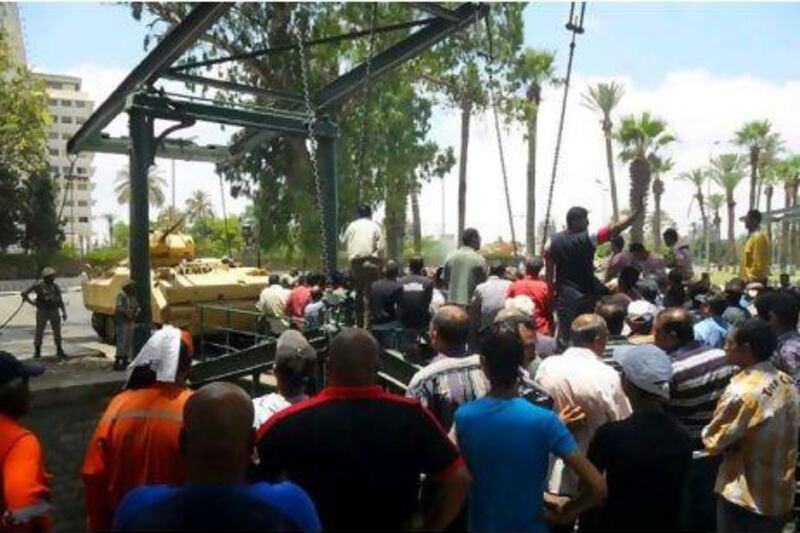ISMAILIA // The uprising that overthrew president Hosni Mubarak raised the hopes of a better life for almost every Egyptian, not least among the legions of skilled workers whose wages in recent years have not kept pace with the rising cost of living.
If events this week in this city on the west bank of the Suez Canal are any indication, there is little room for optimism.
On Tuesday, clashes broke out between police and workers at an industrial free zone, injuring at least 38 people. It was the second day of a strike by the workers, who are demanding that the minimum monthly wage be raised to 1,200 Egyptian pounds (Dh740).
The violence culminated weeks of escalating frustration for workers in Ismailia and nearby Suez, who have been staging protests and labour actions since the beginning of June.
The details of Tuesday's altercation are murky, but news reports suggest it started when military police blocked the exit from the free zone and fired gunshots into the air. Workers replied by pelting the police with stones.
Authorities and workers at the Suez Canal Authority and the companies that crowd the shores of one of the world's most strategic waterways have been edging towards violence for some time.
"At the beginning we were just chanting and holding banners up," Mohamed Hamzawi, an employee of the Al Timsah Shipbuilding Company, said earlier this month. "Now we are blocking roads and entering offices to talk to people. The only thing left is the use of force."
As Mr Hamzawi spoke, a pair of striking workers approached on their way to report to the military prosecutor in the city. They had been summoned for questioning, they said.
Work stoppages aimed at persuading Ahmed Fadhel, the head of the Suez Canal Authority, to implement his promise in April of a 40 per cent wage increase are said to have already cost the canal and the companies that support it millions of dollars, and some vessels have been stranded or unable to leave dry dock after getting repairs.
Workers for at least seven companies in Ismailia and Suez are demanding the same treatment as workers for the authority. Of the nearly 10,000 employees of these firms, thousands have refused to work at one time or another in recent weeks.
The strike was temporarily settled last Thursday. A meeting between workers, Mr Fadhel and the minister of manpower persuaded them to wait until a permanent government is in place before reaching any settlements. Ahmed El Borai, the minister of manpower, convinced workers that implementation of increased base salaries needed to be approved by a sitting parliament.
Whatever the merits of their wage demands, Mr Hamzawi and his fellow workers are more fortunate than many Egyptians.
Nearly 44 per cent of the country's people live on less than US$320 (Dh1,175) a year, and the gap between the richest and poorest Egyptians continues to grow, according to the World Bank.
Whatever government assumes power after elections scheduled for later this year will have to negotiate a budget deficit that stands at more than $3 billion.
Though the Egyptian labour force is the largest in the region, many of the nearly one million yearly graduates of Egypt's universities are unprepared for skilled labour, and the country's productivity levels lag below most other countries in the region except for Yemen and Morocco.
Many Egyptians continue to leave the country to find work - it is no accident that the arm of government that deals with labour is called the Ministry of Manpower and Emigration.
Official unemployment figures of about 10 per cent are almost certainly higher, and the vast majority of the workforce is informally employed. The government spends less than one per cent of GDP on vocational training, according to Heba Hasser, an economist and vice president of Cairo University.
Labour unrest is nothing new in Suez or Egypt. Despite a law from 1942 banning unions that are not approved by the government, thousands of strikes and demonstrations have occurred in the past two decades.
The old law has not been aggressively enforced and three independent unions were formed before January 25 with government approval. Since then, 42 more unions have been established.
Joel Beinin, a professor of Middle Eastern history at Stanford University who has studied Egyptian labour, said: "The current minister of manpower is an advocate of union pluralism, and Egypt is a signatory to international conventions that allow collective bargaining and organising, and he makes the argument that these supersede Egypt's national law. Therefore his ministry has regularly approved independent unions."
But as for how the government deals with labour actions like strikes, Mr Beinin said, the change has been less evident.
"Already from about the late 1990s on it was uncommon for the government to intervene with brute force the way they did in the 1980s and early 1990s The security forces did intervene and try to settle strikes, but there was a little bit more freedom to manoeuvre."
That "freedom to manoeuvre" - such as it is - remains the same since the fall of Mr Mubarak, according to Mohammed Gharib Abdullah, an engineer at Al Timsah Company.
"Nothing changed at all after the revolution. We used to dream of popular revolution, but Ahmed Fadhel is one of Mubarak's men, he's one of the old regime. The Authority workers held a protest in support of Fadhel. It's almost like a counterrevolution," Mr Abdullah said.
* Additional reporting by Agence France-Presse





